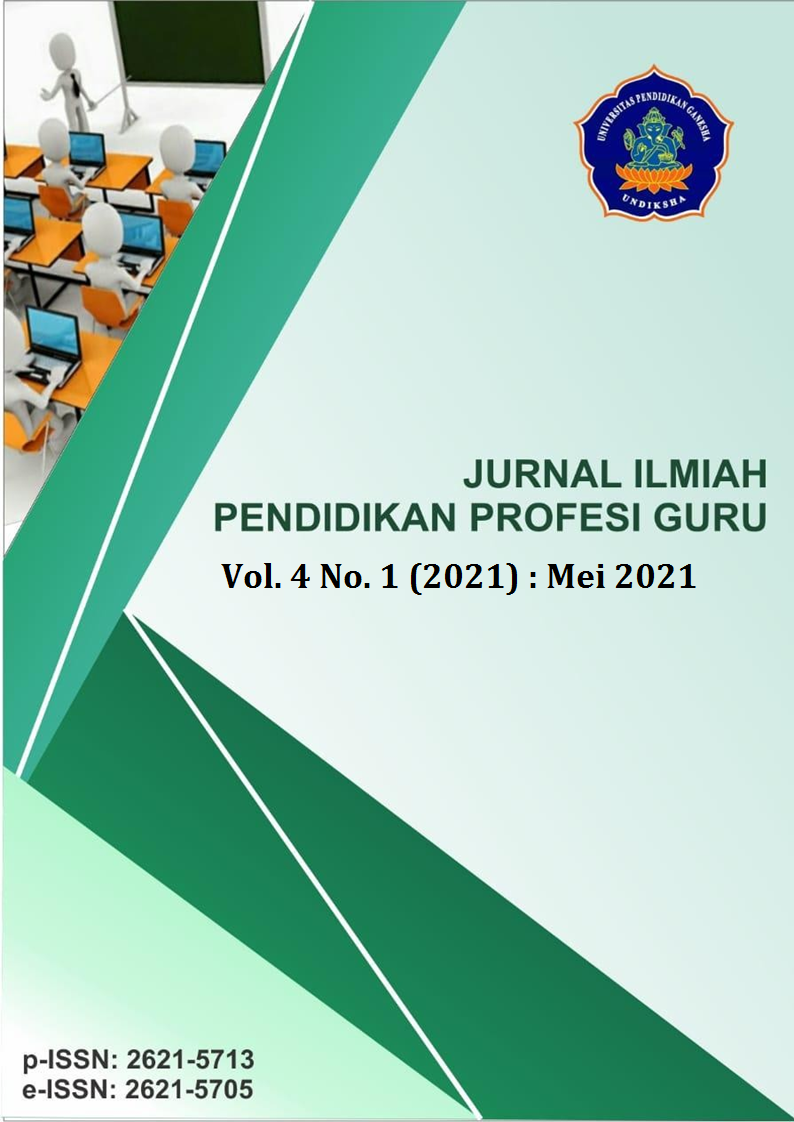Model Pembelajaran Kontekstual Meningkatkan Hasil Belajar Matematika Siswa Kelas V Sekolah Dasar
DOI:
https://doi.org/10.23887/jippg.v4i1.14286Keywords:
Contextual Learning, Mathematics Learning OutcomesAbstract
The low achievement of students' mathematics learning is due to the lack of students' understanding of the subject matter presented by the teacher and in the learning process, the teacher has not implemented an innovative learning model. This study aims to analyze the contextual learning model on the mathematics learning outcomes of fifth-grade elementary school students. This research is a classroom action research that consists of two cycles. Each cycle has stages including the action planning stage, the implementation stage, the observation stage, and the reflection stage. In this study, a contextual learning model was used. The subjects of this study were 38 students of class V, consisting of 14 boys and 24 girls. Data collection methods used in this study were observation and multiple-choice tests. Data analysis in this study used qualitative and quantitative descriptive analysis techniques. In the results of the research in the first cycle, there was an increase in students' mathematics learning outcomes with an average value of 78.42 and a classical mastery percentage of 92%. The results of the research in the second cycle increased to 82.94 with a percentage of 100% classical completeness. This shows that the research target has been achieved in cycle two, namely the average value of student learning outcomes based on the PAP is in the high category. Based on the results of this study, it can be concluded that the use of contextual learning models can improve mathematics learning outcomes for fifth-grade elementary school students.
References
Adirakasiwi, A. G., & Warmi, A. (2018). Penggunaan Software Cabri 3D Dalam Pembelajaran Matematika Upaya Meningkatkan Kemampuan Visualisasi Spasial Matematis Siswa. JURNAL SILOGISME : Kajian Ilmu Matematika Dan Pembelajarannya, 3(1), 28. https://doi.org/10.24269/js.v3i1.972. DOI: https://doi.org/10.24269/js.v3i1.972
Arikunto, S. (2013). Dasar-Dasar Evaluasi Pendidikan. Bumi Aksara.
Azhari, B., & Irfan, A. (2018). Model-Eliciting Activities dalam Menganalisis Kreativitas Pemecahan Masalah Matematika pada Mahasiswa Pendidikan Matematika di PTKIN Aceh. Al-Khawarizmi: Jurnal Pendidikan Dan Pembelajaran Matematika, 2(1). http://dx.doi.org/10.22373/jppm.v2i1.4495. DOI: https://doi.org/10.22373/jppm.v2i1.4495
Lestari, N. A. P. (2019). Pengaruh Implementasi Pembelajaran Kontekstual terhadap Hasil Belajar Matematika dengan Kovariabel Kemampuan Numerik dan Kemampuan Verbal. Jurnal Pendidikan Dasar Nusantara, 5(1), 72. https://doi.org/10.29407/jpdn.v5i1.12845. DOI: https://doi.org/10.29407/jpdn.v5i1.12845
Luh Rai, N. (2019). Penerapan Pendekatan Kontekstual untuk Meningkatkan Hasil Belajar Matematika. Journal of Education Action Research, 3(2), 131. https://doi.org/10.23887/jear.v3i2.17269. DOI: https://doi.org/10.23887/jear.v3i2.17269
Mahendrawan, I. P., Suwatra, I. W., & Suarjana, I. M. (2014). Penerapan Pendekatan Kontekstual untuk Meningkatkan Hasil Belajar Matematika Siswa Kelas V Sekolah Dasar Nomor 1 Tukadsumaga. Mimbar PGSD Undiksha, 2(1). http://dx.doi.org/10.23887/jjpgsd.v2i1.4038.
Masykur, R., Nofrizal, N., & Syazali, M. (2017). Pengembangan Media Pembelajaran Matematika dengan Macromedia Flash. Al-Jabar : Jurnal Pendidikan Matematika, 8(2), 177. https://doi.org/10.24042/ajpm.v8i2.2014. DOI: https://doi.org/10.24042/ajpm.v8i2.2014
Miryani, A. R., Muslim, A., & Pamujo, P. (2020). Peningkatan Prestasi Belajar Matematika melalui Pembelajaran Kontekstual di Sekolah Dasar. MUKADIMAH: Jurnal Pendidikan, Sejarah, Dan Ilmu-Ilmu Sosial, 4(1), 22–25. https://doi.org/10.30743/mkd.v4i1.1522. DOI: https://doi.org/10.30743/mkd.v4i1.1522
Ningsih, Y. L. (2016). Kemampuan Pemahaman Konsep Matematika Mahasiswa Melalui Penerapan Lembar Aktivitas Mahasiswa (LAM) Berbasis Teori APOS pada Materi Turunan. Edumatica, 6(1), 1–8. https://doi.org/10.22437/edumatica.v6i01.2994.
Primayana, K. H., Lasmawan, W., & Adnyana, P. B. (2019). Pengaruh Model Pembelajaran Kontekstual Berbasis Lingkungan Terhadap Hasil Belajar IPA Ditinjau dari Minat Outdoor Pada Siswa Kelas IV. Jurnal Pendidikan Dan Pembelajaran Ipa Indonesia, 9(2), 72–79. https://ejournal-pasca.undiksha.ac.id/index.php/jurnal_ipa/article/view/2905/0.
Putra, F. G. (2017). Eksperimentasi Pendekatan Kontekstual Berbantuan Hands on Activity (HoA) Terhadap Kemampuan Pemecahan Masalah Matematik. Al-Jabar : Jurnal Pendidikan Matematika, 8(1), 73–80. https://doi.org/10.24042/ajpm.v8i1.1148. DOI: https://doi.org/10.24042/ajpm.v8i1.1148
Rahayu, D. P. (2019). Penggunaan Model Pembelajaran Kontekstual untuk Meningkatkan Hasil Belajar Materi Bangun Datar di Kelas III Sekolah Dasa. Musamus Journal of Primary Education, 1(2), 061–072. https://doi.org/10.35724/musjpe.v1i2.1464. DOI: https://doi.org/10.35724/musjpe.v1i2.1464
Ramdani, E. (2018). Model Pembelajaran Kontekstual Berbasis Kearifan Lokal sebagai Penguatan Pendidikan Karakter. Jupiis: Jurnal Pendidikan Ilmu-Ilmu Sosial, 10(1), 1. https://doi.org/10.24114/jupiis.v10i1.8264. DOI: https://doi.org/10.24114/jupiis.v10i1.8264
Riski Juniarti1, N. K., Margunayasa, I. G., & Kusmariyatni, N. (2020). Hubungan Antara Pola Asuh Orang Tua dan Konsep Diri dengan Kompetensi Pengetahuan Matematika Siswa. Jurnal Ilmiah Sekolah Dasar, 4(1), 17. https://doi.org/10.23887/jisd.v4i1.24273. DOI: https://doi.org/10.23887/jisd.v4i1.24273
Setiawan, P., & Sudana, I. D. N. (2018). Penerapan Model Pembelajaran Kontekstual untuk Meningkatkan Hasil Belajar Matematika. Jurnal Ilmiah Pendidikan Profesi Guru, 1(2). http://dx.doi.org/10.23887/jippg.v1i2.16397. DOI: https://doi.org/10.23887/jippg.v1i2.16397
Setyadi, D., & Qohar, A. (2017). Pengembangan Media Pembelajaran Matematika Berbasis Web Pada Materi Barisan Dan Deret. Kreano, Jurnal Matematika Kreatif-Inovatif, 8(1), 1–7. https://doi.org/10.15294/kreano.v8i1.5964. DOI: https://doi.org/10.15294/kreano.v8i1.5964
Zairisma, Z., Apriliani, V., & Yunus, J. (2020). Mathematical Representation Ability of Middle School Students through Model Eliciting Activities with STAD Type. Desimal: Jurnal Matematika, 3(2), 109–116. https://doi.org/10.24042/djm.v3i2.5751. DOI: https://doi.org/10.24042/djm.v3i2.5751
Downloads
Published
How to Cite
Issue
Section
License

Jurnal Ilmiah pendidikan profesi guru is licensed under a Creative Commons Attribution-ShareAlike 4.0 International License.






